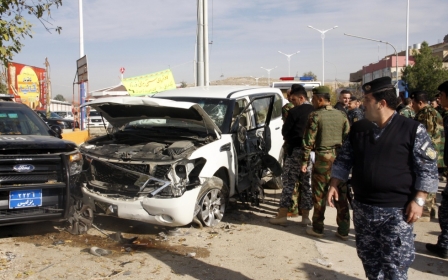Weapons stolen in Mosul militant takeover arrive in Syria

Humvees and other weapons have reportedly arrived in eastern Syria after militants seized them when they took over Iraq's second-largest city on Tuesday.
The capture of Mosul, a key centre for the country's oil industry, sent thousands of residents fleeing, including hundreds of prisoners from three jails, as the militants took over banks, TV stations and the city's airport.
Prime Minister Nuri al-Maliki asked Iraq's parliament to declare a state of emergency and announced that the government will arm citizens to fight the Islamic State of Iraq and the Levant (ISIL) militants who launched their Mosul attack late Monday.
Maliki has also called on Iraqi MPs to convene in Baghdad on Thursday to discuss the security situation and also urged tribal leaders and the international community to assist after Iraq's second city in one year has fallen out of government control.
As stolen weapons from Mosul reportedly crossed into Syria late Tuesday, the US officials condemned the militant's attack "in the strongest possible terms."
"It should be clear that ISIL is not only a threat to the stability of Iraq, but a threat to the entire region," said State Department spokeswoman Jen Psaki.
Photos shared on social media on Tuesday showed ISIL's Shaykh 'Umar as-Shishani reportedly arriving in Deir ez-Zor in eastern Syria with a humvee.
Fighters seized Mosul on Tuesday as troops threw away their uniforms and abandoned their posts, officials said, in another blow to the authorities, who appear incapable of stopping militant advances.
Predominantly Sunni Muslim Mosul, 350 kilometres (220 miles) north of Baghdad, has long been a militant stronghold and one of the most dangerous areas in the country.
Capital of Nineveh province, it is the second city after Fallujah, west of the capital, that the government has lost this year.
"The city of Mosul is outside the control of the state and at the mercy of the militants," an interior ministry official told AFP, saying soldiers had fled after removing their uniforms.
Adding that the gunmen were Sunni, he said they announced over loudspeakers that they had "come to liberate Mosul and would fight only those who attack them."
A brigadier general in the military command responsible for Nineveh told AFP clashes with hundreds of ISIL militants began late Monday.
He said military units withdrew from the city's east to its west, and then began leaving the city, with the militants now in control.
Earlier in the day, another security source confirmed to AA that the militants had controlled Mosul airport as they swept the northern half of the city.
Several local television channels transmitting from the city had gone off air after the militants advanced into the city.
An AFP journalist, himself fleeing the city with his family, said shops were closed, security forces had abandoned vehicles and a police station had been set ablaze.
Militants have launched major operations in Nineveh, Anbar, Diyala, Salaheddin and Baghdad provinces since Thursday, killing scores of people and highlighting both their long reach and the weakness of Iraq's security forces.
In early January, the government lost control of Fallujah, just a short drive from Baghdad.
Violence is running at its highest levels since 2006-2007, when tens of thousands were killed in sectarian conflict.
More than 900 people were killed last month, according to figures separately compiled by the United Nations and the government.
So far this year, more than 4,600 people have been killed, according to AFP figures.
Officials blame external factors for the rising bloodshed, particularly the civil war in neighbouring Syria.
But analysts say widespread Sunni Arab anger with the Shiite-led government has also been a major factor.
Stay informed with MEE's newsletters
Sign up to get the latest alerts, insights and analysis, starting with Turkey Unpacked
Middle East Eye delivers independent and unrivalled coverage and analysis of the Middle East, North Africa and beyond. To learn more about republishing this content and the associated fees, please fill out this form. More about MEE can be found here.





